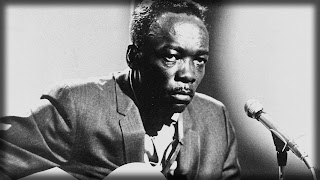By Laurel Hughes - Clarion-Ledger - 1986
Mississippi
has, of all 50 states, been one of the half dozen leading contributors to the main currents of American music. The blues of African Americans "embraces several side streams boogie-woogie, stomps, ragtime, gospel,
spirituals, rock and roll, and barrelhouse, but it may be broadly categorized
as blues." The music depicts black
America, and most masters of the rhythm are blacks or are devotees of the "black sound," a powerful channel of musical expression. The
"rhythm and blues" label for years applied to a musical underground
that was spoken of, scornfully by some, as "race music," but its insistent beat
broke out in the late 40s and early 50s, taking the air waves by storm.
TWIN
BREAKOUT
The
public as a whole curiously enough, became aware of the blues about the same
time that country music surged into the national consciousness: and both have
deeply influenced the popular music of the last two decades. In the
mid-50s, they met and produced a hybrid called rock and roll which charged
American music with an electricity it had not previously known. While Elvis
Presley represented the white side of the fashion, two Mississippi natives
named Bo Diddley and John Lee Hooker embodied the black side. Other names
prominent in the advance of the blues are such Mississippi born or reared
artists as Big Bill Broonzy, Muddy Waters, Mississippi John Hurt, Fred
McDowell, B.B. King, Sonny Boy Williamson, Joe Turner, Bill Walter Horton,
Mississippi Joe Callicott, Johnny Young, Furry Lewis, Booker T. Washington White
(who performed as Bukka White), Son House, Skip James, Ike Turner, and still
more.
DELTA
FOUNTAINHEAD
 Several
of the artists came from the Mississippi Delta which has led to the claim by some
blues buffs that within a 50-mile radius of Cleveland came more blues stars
than from the remainder of the United States. While this has not been specifically
reunited, the record does show that a number came from other sections of the
state. A most prominent artist, John Lee Hooker came from the Delta. John Lee Hooker
was the son of' sharecroppers, an occupation that prized children as an economic boon in unpaid labor. There were 13 children in Hooker's
family. Hooker's stepfather was William Moore. a blues guitarist himself and
widely known in the Delta region. It was from him that John Lee learned the
guitar.
Several
of the artists came from the Mississippi Delta which has led to the claim by some
blues buffs that within a 50-mile radius of Cleveland came more blues stars
than from the remainder of the United States. While this has not been specifically
reunited, the record does show that a number came from other sections of the
state. A most prominent artist, John Lee Hooker came from the Delta. John Lee Hooker
was the son of' sharecroppers, an occupation that prized children as an economic boon in unpaid labor. There were 13 children in Hooker's
family. Hooker's stepfather was William Moore. a blues guitarist himself and
widely known in the Delta region. It was from him that John Lee learned the
guitar.
BLURRED
BY TALES
Hooker's
personal history is blurred by the legends and stories that grow around noted
individuals, particularly those with a past that lends itself to romanticism.
Hooker's first attempts at music were characterized by two stories — one
concerns Hooker's grandfather teaching him to pick melodies on strips of inner
tube nailed to the barn door at various tensions and one about his own homemade
instrument made under the direction of his father. Whatever were his first encounters with music, Hooker developed his own rhythmic complexity countered by simple
harmony.
At
14, John Lee began playing for country suppers and fish fries. Hooker ran away
to Memphis and the famous Beale Street where he obtained a job selling candy at
a theatre. His concerned parents soon found him and took him home; Hooker made frequent
escapes, however, and was soon allowed to reside in Memphis.
GOSPEL STRAIN
Coming from a religious background. he sang gospel with a Baptist group in
Memphis and worked in a factory. From the time he left Memphis to escape the deeply engrained and resilient forms of racism prevalent in the Jim Crow South, Hooker was a drifter, working in various factories
during World War II. The new friends he found in Detroit encouraged him to pursue
his musical career again and soon local clubs began featuring him at
after-hours sessions. Some clubs gave him work on a regular basis, which opened
the door for him to make his first recordings.



















